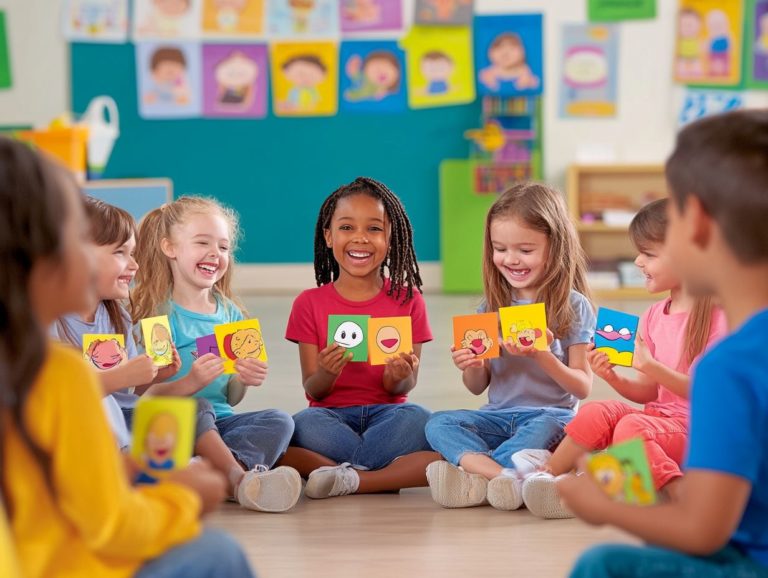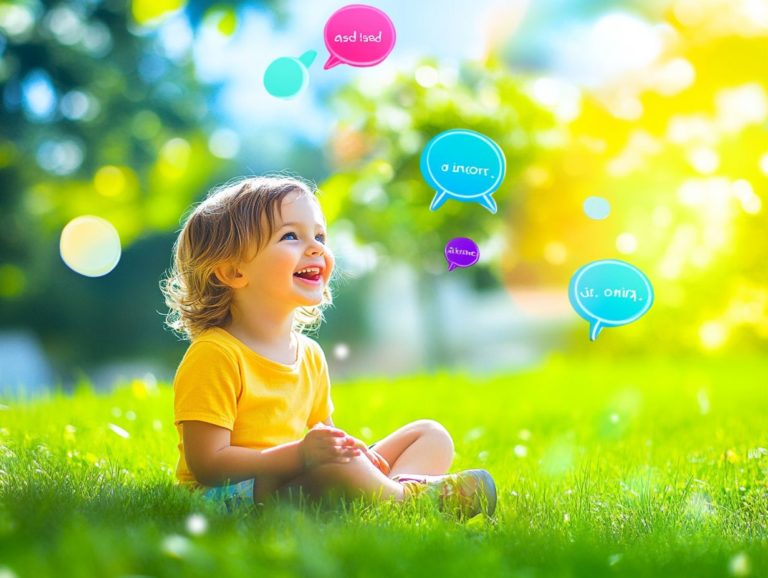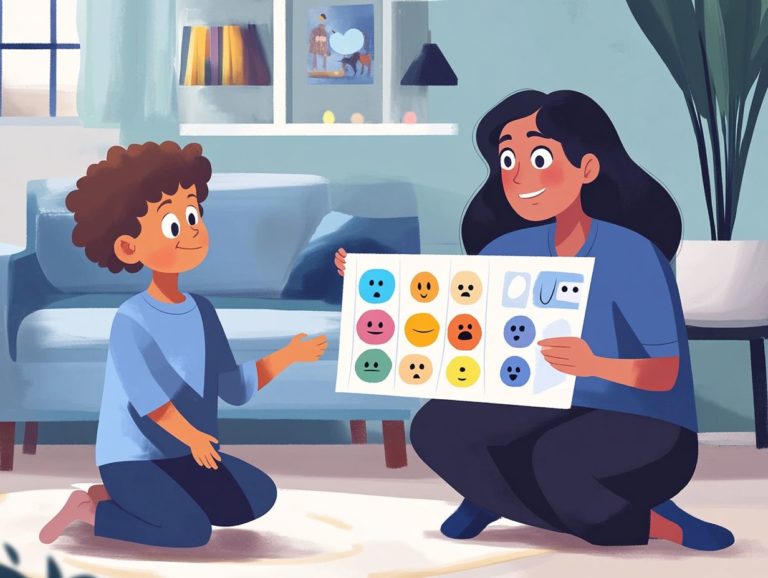5 Ways to Celebrate Emotional Awareness Day
Emotional Awareness Day presents a crucial opportunity for you to deepen your understanding of emotions and their profound impact on mental health, well-being, and workplace culture.
You can celebrate this day in five engaging ways, from practicing mindfulness to immersing yourself in creative activities and even participating in a mental health program or mental health fair.
Together, we will delve into the significance of emotional awareness, the common barriers you might encounter, and practical tips for weaving these insights seamlessly into your daily life, including self-care and connecting with others.
By the end, you’ll recognize how celebrating this day can cultivate a more emotionally intelligent society, empowering both you and your community through community support and enhanced social connections.
Contents
- Enhancing Emotional Wellness: Practical Strategies
- What Is Emotional Awareness Day and Why Is It Important?
- How Can Emotional Awareness Benefit One’s Mental Health?
- What Are Some Common Barriers to Emotional Awareness?
- Incorporating Emotional Awareness into Daily Life
- What Are Some Resources Available for Improving Emotional Awareness?
- How Can Celebrating Emotional Awareness Day Help Create a More Emotionally Intelligent Society?
- Frequently Asked Questions
- What is Emotional Awareness Day?
- When is Emotional Awareness Day celebrated?
- How can I celebrate Emotional Awareness Day?
- Why is it important to celebrate Emotional Awareness Day?
- Can I celebrate Emotional Awareness Day alone?
- Are there any specific traditions associated with celebrating Emotional Awareness Day?
Key Takeaways:

- Practice mindfulness to become more aware of your emotions and thoughts, and engage in mindfulness practices for better stress management.
- Writing in a gratitude journal can help you identify and understand your emotions while boosting your self-esteem.
- Open conversations with trusted individuals or community groups can provide support and insight into your emotions, enhancing your emotional support system.
1. Practice Mindfulness
Practicing mindfulness is an exceptional tool for enhancing your mental health and emotional wellness. It empowers you to manage stress effectively, cultivate healthy habits, and connect with your inner self, ultimately leading to improved overall well-being. Techniques such as meditation, deep breathing, and focused attention can significantly reduce anxiety and boost your emotional resilience. Engaging in mindfulness practices can also positively impact your overall mental wellness.
Incorporating mindfulness into your daily routine can be as simple as dedicating a few minutes each day for meditation or engaging in mindful walking, where you pay attention to each step and the sensations around you. Techniques like body scanning can help you become more aware of your physical sensations, offering deeper insights into your mental state. Practicing gratitude through a gratitude journal can also enhance your positivity and emotional stability, contributing to your overall well-being.
Consistency in these practices is key. Regular mindfulness training conditions your mind to respond to stressors with calmness rather than panic, fostering a resilient mental state that not only manages current stress but also equips you for future challenges. Incorporating relaxation rooms at work can further support these efforts.
2. Write in a Journal
Engaging in journaling, especially through a gratitude journal, becomes an invaluable self-care practice that nurtures emotional well-being and enhances mental wellness. This practice allows you to pause and reflect on your thoughts and feelings, creating a space for introspection and boosting your self-esteem.
As you embark on this reflective journey, you may find that your self-esteem improves. By documenting positive experiences and achievements, you naturally shift your focus toward your personal strengths and growth. Journaling creates a safe haven for expressing emotions, serving as a tool to manage stress, anxiety, and other mental health conditions.
To get started, simply set aside a few minutes each day to jot down three things you re grateful for. From there, you can gradually expand your entries to encompass your thoughts, dreams, and even challenges. This practice can greatly enhance your emotional health and mental wellness.
You ll discover various techniques that cater to different preferences, such as bullet journaling or expressive writing, ensuring that journaling is accessible to everyone.
Over time, the cumulative benefits of regular writing can significantly enhance your mental health, leading to a more positive outlook on life and fostering greater emotional resilience.
Enhancing Emotional Wellness: Practical Strategies
3. Have an Open Conversation with a Trusted Friend or Family Member
Engaging in open conversations with trusted friends or family members is essential for your emotional support. It enables you to share your feelings and thoughts, significantly alleviating mental health conditions.
This process enhances your social connections and overall mental wellness. When you share your experiences, you often discover common ground, leading to a deeper understanding of each other’s challenges and triumphs.
This shared vulnerability fosters empathy and helps dismantle the stigma often associated with mental illness and other psychological disorders, encouraging others to seek help when they need it.
Support groups, for example, allow you to connect with people facing similar struggles, creating a safe haven where you can express yourself freely. Such interactions promote a sense of belonging, reinforcing the idea that you are not alone on your journey.
These social connections do wonders for your emotional relief and overall well-being! Participating in local community groups enhances these connections.
4. Engage in a Creative Activity
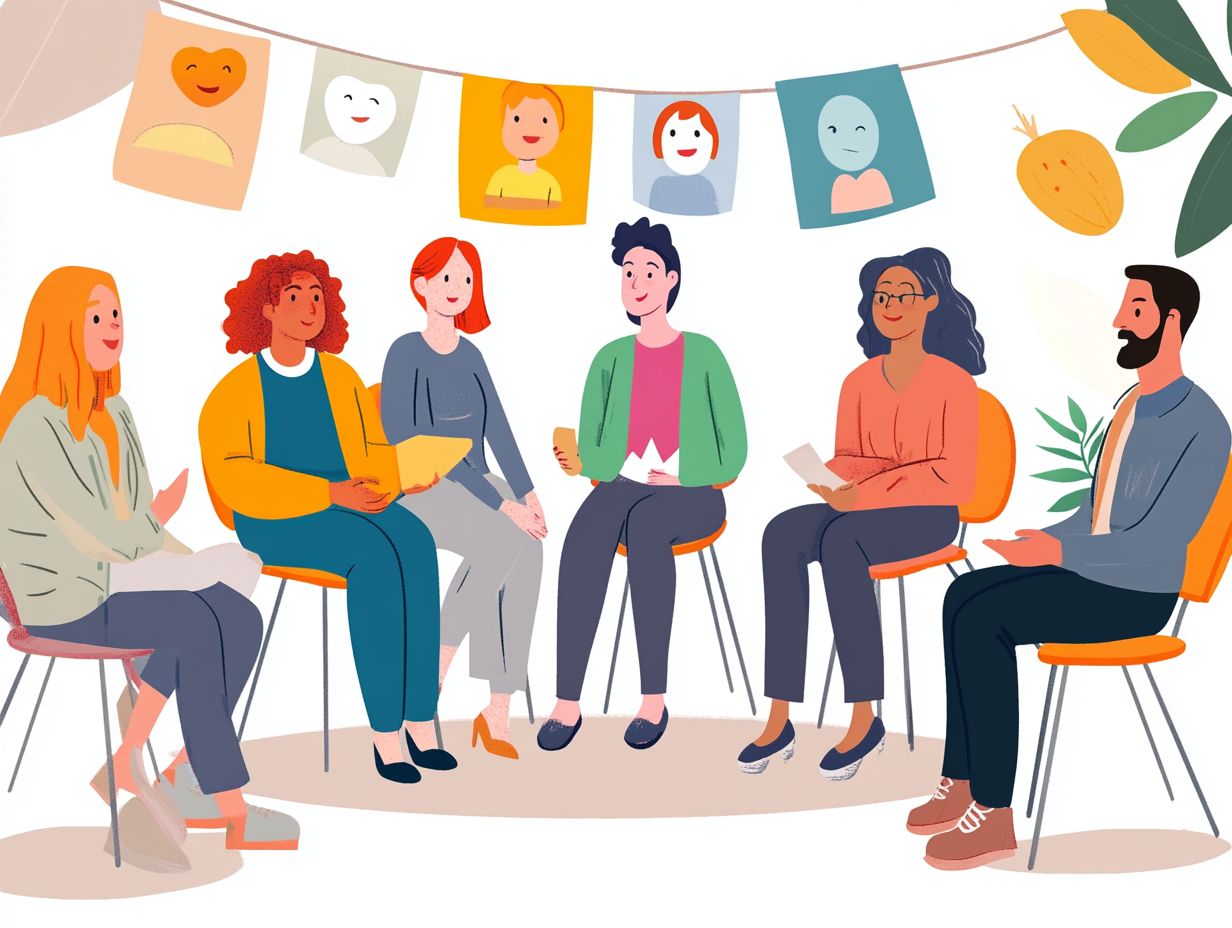
Engaging in creative activities, such as DIY projects or art, offers remarkable mental health benefits. These activities allow you to cultivate positive experiences and enhance your emotional wellness through self-expression and personal exploration.
Creative activities like painting can also serve as effective coping strategies. They enable you to channel your thoughts and feelings into something tangible, serving as a powerful outlet for stress relief.
By exploring different forms of creativity be it painting, writing, or making music you can achieve profound emotional catharsis while fostering mindfulness and meeting your personal goals in your daily life.
Incorporating creative endeavors into your routine, whether it s setting aside time for journaling or gathering supplies for a weekend craft project, can instill a sense of purpose and achievement. Ultimately, the joy and satisfaction you derive from these artistic ventures can elevate your mood, bolster your resilience, and deepen your connection with both yourself and others.
5. Attend a Workshop or Seminar on Emotional Intelligence
Attending workshops or seminars that focus on emotional intelligence is an excellent way to elevate your mental health awareness and cultivate essential skills for improving interpersonal relationships and emotional regulation. These events often discuss crucial mental health topics, providing valuable insights.
By participating in these events, you can learn to identify and manage your emotions more effectively. You’ll enhance your empathy towards others and strengthen your social skills qualities that are crucial in both your personal and professional life.
This can also lead to better workplace culture and employee support systems. The importance of community groups in fostering discussions around mental health is significant; they create a supportive environment that encourages open dialogue and shared experiences.
Participating in events like Mental Health Awareness Month or NAMIWalks can also be beneficial. As you become more attuned to your emotional states and those of the people around you, you’ll likely discover that this heightened emotional awareness paves the way for healthier relationships and better mental health outcomes.
This holistic approach not only serves you well but can also create a ripple effect, enhancing the overall well-being of your community. Leveraging mental health resources like those from Mental Health America (MHA) and the National Alliance on Mental Illness (NAMI) can provide additional support.
Start exploring these strategies today to enhance your emotional wellness and connect with others in meaningful ways!
What Is Emotional Awareness Day and Why Is It Important?
Emotional Awareness Day is your opportunity to spotlight the importance of emotional wellness and mental health awareness. It encourages you to recognize, understand, and manage your emotions as well as those of others. Ultimately, this helps cultivate a supportive community around mental health discussions. Utilizing resources like the Emotional Wellness Toolkit can aid in this endeavor.
This observance was established to tackle the escalating mental health crisis. It aims to educate the public on the vital role of emotional intelligence and resilience. By creating avenues for open dialogue, these events serve as platforms where you can share personal stories, effectively breaking down barriers and reducing the stigma often attached to mental health issues.
Initiatives like the 988 Suicide & Crisis Lifeline are integral to these efforts.
Through engaging workshops, discussions, and community activities, you are empowered to seek assistance and provide support to those who need it. The exciting mission is to make mental health resources accessible for everyone! Everyone deserves to understand that emotional well-being is not just important but a fundamental aspect of overall health that deserves attention and care. Platforms like GOV.UK and local mental health screening events can further support these initiatives.
How Can Emotional Awareness Benefit One’s Mental Health?
Enhancing your emotional awareness can unlock significant mental health benefits, including stronger emotional support systems, effective coping strategies, and overall mental wellness. As you learn to navigate your emotions more proficiently, you ll find that understanding and articulating your feelings fosters better emotional regulation while strengthening your relationships with others. Engaging in physical exercise can also improve your emotional health.
When you recognize your emotional states, it empowers you to respond thoughtfully rather than react impulsively during challenging interactions an essential skill for effective conflict resolution. This awareness also encourages you to reach out for help when necessary, helping to break down the stigma surrounding mental health issues. Participating in mental health advocacy initiatives can further support this.
To cultivate emotional awareness, consider integrating these practical tips into your daily routine:
- Maintain a daily gratitude journal to reflect on your feelings and positive experiences.
- Practice mindfulness meditation to enhance your present-moment awareness.
- Engage in open conversations about emotions with trusted peers.
By incorporating these practices into your life, you can significantly boost your emotional intelligence, paving the way for a more fulfilling existence.
What Are Some Common Barriers to Emotional Awareness?

Common barriers to your emotional awareness can often stem from societal stigma surrounding mental health, low self-esteem, and a lack of emotional education. These hurdles may prevent you from fully grasping and expressing your feelings. Engaging in activities like volunteering can help overcome these barriers.
Such barriers can create a cycle of misunderstanding and repression. Cultural norms discourage vulnerability and emotional expression, leaving you feeling isolated in your experiences. Personal histories, including past trauma or negative familial attitudes towards emotions, can further complicate your ability to recognize and articulate how you truly feel.
You might internalize the notion that emotional openness equals weakness, reinforcing a reluctance to confront your emotional states. Overcoming these barriers is vital; doing so can lead to healthier relationships, enhance your overall well-being, and ultimately pave the way for improved mental health outcomes.
Incorporating Emotional Awareness into Daily Life
Experience the transformative power of mindfulness! Incorporating emotional awareness into your daily life is within reach by implementing straightforward yet powerful strategies.
You can practice mindfulness, set personal goals, and tap into mental health resources to gain a deeper understanding of your emotions.
Dedicate a few minutes each day to mindfulness practices. This helps cultivate a present-focused mindset and improves emotional regulation.
Engage in deep breathing exercises, meditate, or enjoy a mindful walk in nature. Keeping a daily journal can be an incredibly effective tool for you; it offers a space for self-reflection and clarity about your feelings and triggers.
As you jot down your thoughts, you ll begin to see patterns emerge over time. Engaging with a supportive community through volunteering or participating in group activities fosters connection and empathy, ultimately enhancing your emotional intelligence.
By weaving these practices into your daily routine, you can enrich your emotional landscape, leading to healthier relationships and a greater sense of overall well-being.
What Are Some Resources Available for Improving Emotional Awareness?
A wealth of resources awaits you to enhance your emotional awareness, ranging from mental health programs and community groups to workshops and online platforms.
These avenues offer invaluable tools and insights for those seeking to elevate their emotional intelligence. For example, organizations like the Emotional Intelligence Consortium and the Greater Good Science Center provide enlightening courses and articles that explore various facets of emotional literacy.
By participating in community events, such as local workshops or support groups, you cultivate a sense of connection and encourage the practical application of skills through shared experiences.
Mental health programs often incorporate interactive activities designed to promote self-reflection and enhance skills to relate better with others, creating a solid foundation for healthier relationships in both personal and professional spheres.
By engaging with these resources, you equip yourself to navigate your emotions more effectively, ultimately leading to a deeper sense of life satisfaction and emotional resilience.
How Can Celebrating Emotional Awareness Day Help Create a More Emotionally Intelligent Society?
Celebrating Emotional Awareness Day can play a pivotal role in cultivating a more emotionally intelligent society by encouraging open dialogue about mental health, fostering community support, and promoting emotional wellness on all fronts.
This day acts as a catalyst, prompting you to reflect on your own emotional health and join your community in a spirit of unity.
By organizing workshops, seminars, and discussion panels, you can gain invaluable insights into emotional literacy and its significance in daily life. For instance, schools that host events centered around emotional learning empower students to develop resilience and empathy, enhancing their interactions with peers.
In the workplace, prioritizing emotional awareness through team-building activities or mental health days helps create a culture of understanding and support. This can lead to increased productivity and employee satisfaction.
Thus, embracing Emotional Awareness Day can reshape societal perceptions, making emotional wellness a collective priority for everyone.
Frequently Asked Questions
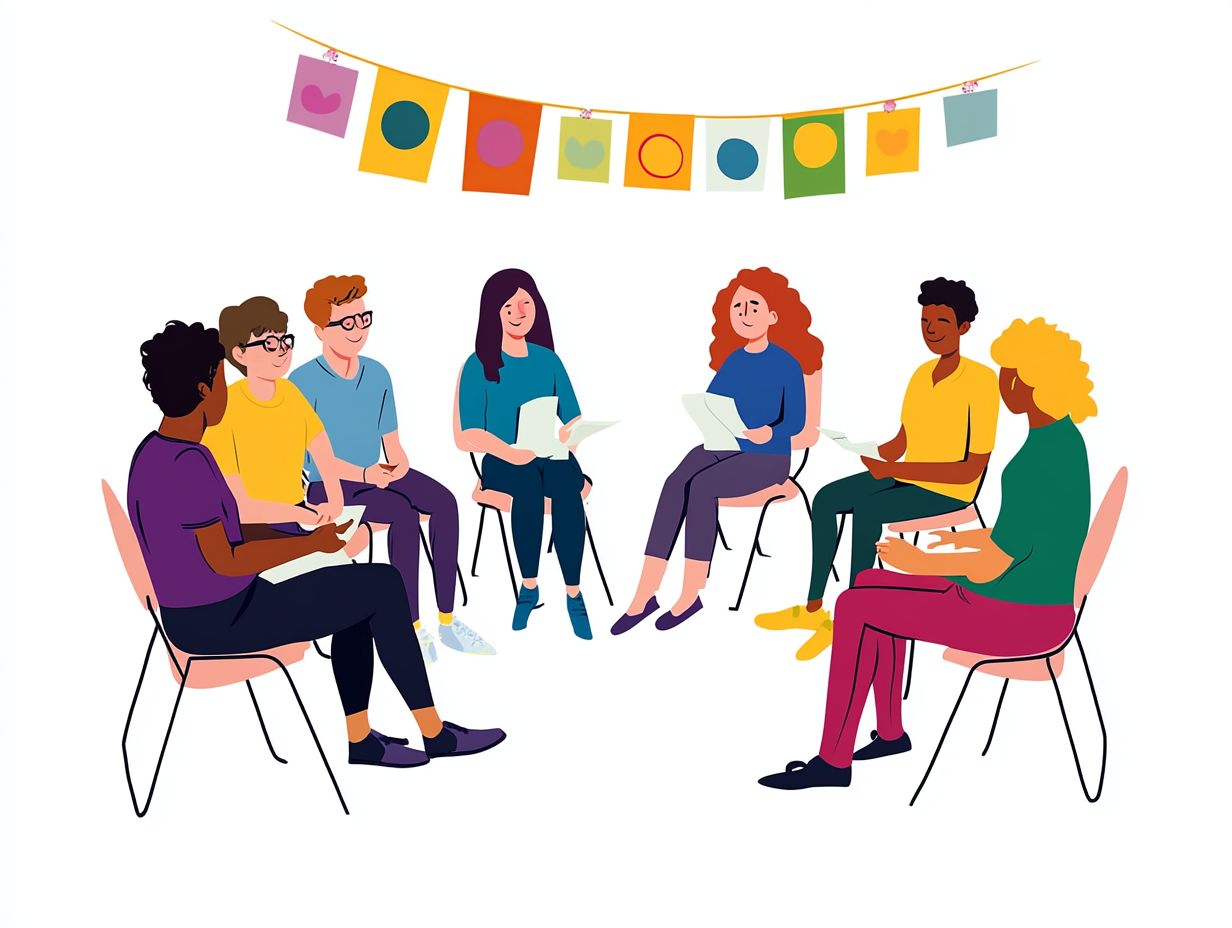
What is Emotional Awareness Day?
Emotional Awareness Day is a day dedicated to recognizing and understanding our own emotions as well as the emotions of those around us.
When is Emotional Awareness Day celebrated?
Emotional Awareness Day is celebrated on September 7th every year.
Consider participating in Emotional Awareness Day or seeking out the resources mentioned to further enhance your emotional intelligence.
In summary, incorporating emotional awareness into your daily life through mindfulness practices, engaging with community resources, and celebrating Emotional Awareness Day can lead to a more emotionally intelligent society.
How can I celebrate Emotional Awareness Day?
You can celebrate Emotional Awareness Day in many ways. Here are 5 unique ideas to get you started:
- Take a moment to be aware of your thoughts and feelings.
- Write in a journal about your feelings and experiences.
- Have meaningful conversations with loved ones about emotional well-being.
- Engage in self-care, which means taking care of your physical and mental health, through activities like exercise, meditation, or treating yourself.
- Donating to or volunteering at a mental health organization can make a big difference.
Why is it important to celebrate Emotional Awareness Day?
Celebrating Emotional Awareness Day allows us to prioritize our mental and emotional well-being. This focus is crucial for overall health and happiness.
It also helps to break the stigma surrounding mental health. By doing so, we encourage open conversations about emotions.
Can I celebrate Emotional Awareness Day alone?
Yes, absolutely! While celebrating with others can be beneficial, taking time for self-reflection and emotional growth on your own is also important.
Feel free to celebrate Emotional Awareness Day in whatever way feels most comfortable and meaningful to you.
Are there any specific traditions associated with celebrating Emotional Awareness Day?
No, there are no specific traditions for celebrating Emotional Awareness Day. It is up to individuals and communities to create their own unique ways to honor and celebrate emotional awareness.
Get creative and discover what makes celebrating this day special for you!
Don t wait! Start planning your celebration of Emotional Awareness Day now!

